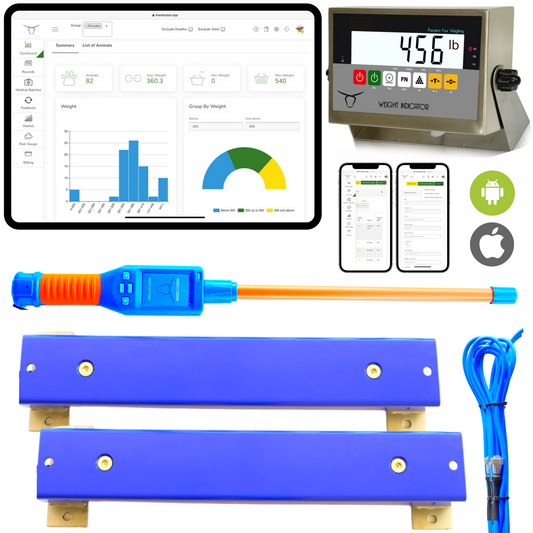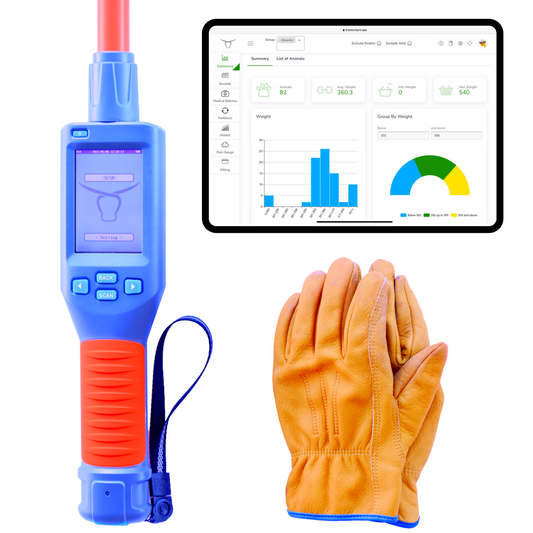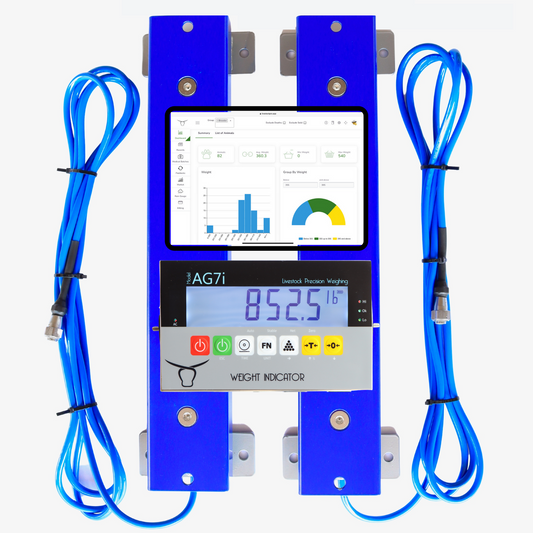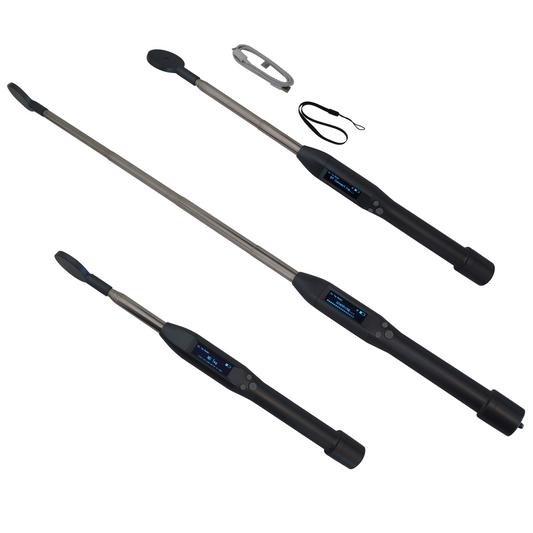Cattle scales play a crucial role in the agricultural industry, particularly in Australia, where livestock farming is an essential part of the economy. These scales are necessary for various reasons, and understanding their importance and functionality is vital. Let's delve into the subject further.
Why are Cattle Scales Necessary?
Cattle scales are necessary for accurate weight measurement of livestock. They provide valuable information for managing herd health, tracking growth, determining feed efficiency, and making informed decisions about animal nutrition and management practices.
How are Cattle Scales Used in Australia?
In Australia, cattle scales are used to weigh individual animals or groups of cattle. They are employed in various settings, such as farms, feedlots, and abattoirs, to monitor the weight gain of animals, estimate their value, and ensure appropriate management strategies.
Types of Cattle Scales
There are different types of cattle scales available in the market, each with its own features and functionalities. The most common types are mechanical cattle scales, electronic cattle scales, and portable cattle scales. These scales offer unique advantages and cater to different weighing needs.
Features to Consider When Choosing Cattle Scales
When selecting cattle scales, several features should be taken into account. These include weight capacity, accuracy, durability, and size/design. Each feature plays a critical role in ensuring reliable and efficient weighing operations.
Benefits of Using Cattle Scales
The use of cattle scales offers numerous benefits to livestock farmers. Firstly, it enables accurate weight measurement, which is crucial for calculating livestock values and tracking growth. Secondly, cattle scales help in monitoring the health and overall well-being of the animals. Lastly, they assist in determining feed efficiency and optimizing feeding strategies.
How to Use Cattle Scales Properly
To obtain accurate results, proper usage of cattle scales is essential. This involves adequately preparing the cattle, ensuring proper placement on the scales, and recording and analyzing the collected data for effective decision-making.
Purchasing and Maintenance of Cattle Scales
When it comes to purchasing cattle scales in Australia, there are several reliable suppliers available in the market. Proper maintenance of the scales is crucial to ensure their longevity and accuracy. Following maintenance tips will help maximize the lifespan and performance of the scales.
By understanding the importance, functionality, and various aspects associated with cattle scales, farmers in Australia can make informed decisions in managing their livestock and maintaining a thriving agricultural industry.
Key takeaway:
- Cattle scales are essential for accurate weight measurement: Cattle scales ensure precise weight measurements for monitoring health, growth, and feed efficiency. Accurate weight data is vital for effective livestock management.
- Various types of cattle scales are available: Mechanical, electronic, and portable cattle scales offer different features and benefits. It's important to consider weight capacity, accuracy, durability, and size when choosing the right cattle scale.
- Proper usage and maintenance are key: Preparing cattle, ensuring proper placement on the scale, and recording and analyzing data are crucial steps to obtain reliable measurements. Regular maintenance and purchasing from trusted suppliers are necessary for long-lasting and efficient cattle scales.
Importance of Cattle Scales in Australia
Cattle farming is a significant industry in Australia, and the importance of cattle scales in Australia cannot be overstated. Cattle scales play a crucial role in various aspects of the industry, including livestock management, animal health, and profitability.
Cattle scales enable accurate measurement of weight, which is of utmost importance for monitoring the health and growth of individual animals. Regular weighing helps identify any health issues or underperforming cattle, allowing farmers to take appropriate action in a timely manner.
Cattle scales also aid in the efficient management of feed and nutritional programs. With precise weight measurements, farmers can ensure optimal feeding regimes, preventing over or underfeeding, which can have a significant impact on cattle health and productivity.
When it comes to selling livestock, weight is a key factor in determining the price. Accurate weighing using cattle scales helps farmers achieve fair market value for their cattle, thereby maximizing profitability.
The importance of cattle scales in Australia cannot be underestimated. They are essential tools that assist farmers in managing their livestock effectively, optimizing animal health, and maximizing economic returns.
Why are Cattle Scales Necessary?
Why are Cattle Scales Necessary?
Cattle scales are necessary for several reasons in the farming and livestock industry. They play a crucial role in managing the health and productivity of cattle, as well as ensuring accurate record-keeping and efficient management practices.
Cattle scales are essential for accurately determining the weight of cattle. This information is vital for monitoring the growth and health of individual animals, as well as for determining dosage requirements for medication or supplements.
Weighing cattle regularly helps in monitoring their overall health and well-being. Sudden weight loss or gain can indicate health issues that need attention, allowing farmers to take prompt action and prevent potential problems.
Cattle scales are necessary for calculating feed efficiency. By weighing the cattle and measuring the amount of feed they consume, farmers can determine how efficiently their cattle are converting feed into body mass. This information enables farmers to adjust feeding practices and optimize their operations.
In summary, cattle scales are necessary in the livestock industry for accurate weight measurement, monitoring health and growth, and determining feed efficiency. They are a valuable tool for farmers in managing their cattle effectively and maintaining a profitable operation.
How are Cattle Scales Used in Australia?
In Australia, cattle scales play a vital role in the livestock industry, serving various purposes. One key application of cattle scales is the monitoring of individual animals' weight, which is crucial for farmers and ranchers to track the growth and overall health of their cattle. Accurate weight measurements provided by cattle scales help determine the appropriate feeding and healthcare practices. Moreover, cattle scales are essential in evaluating the efficiency of feed conversion, allowing farmers to optimize their livestock management.
Furthermore, cattle scales are valuable tools in assessing the market value of livestock. Through determining the weight of cattle, farmers can calculate the expected yield and negotiate better prices at auctions or when selling directly to buyers.
In addition to these applications, cattle scales contribute significantly to research and breeding programs. Scientists utilize cattle scales to collect precise data on the genetics and performance of individual animals, aiding in selective breeding and the improvement of the overall cattle population.
Overall, cattle scales serve as indispensable tools in the Australian livestock industry. They enable farmers to make informed decisions, enhance productivity, and ensure the well-being of their herds.
Fun Fact: The beef industry is the largest agricultural sector in Australia, with over 24 million cattle contributing to its remarkable success.
Types of Cattle Scales
When it comes to weighing cattle, there's a variety of scales available to suit different needs. In this section, we'll explore the different types of cattle scales that you can choose from. From mechanical scales that offer traditional weighing methods to electronic scales that provide precise digital measurements, we'll delve into the advantages and applications of each. We'll also touch upon the convenience and versatility of portable cattle scales. So, let's dive into the world of cattle scales and discover which one fits your requirements best!
Mechanical Cattle Scales
Mechanical cattle scales, which are widely used in the agricultural industry to measure the weight of cattle, operate using mechanical mechanisms rather than electronic components. These scales are renowned for their simplicity and durability, making them a favored choice among farmers and ranchers.
Presented below is a table highlighting the key features and benefits of mechanical cattle scales:
| Features: | Benefits: |
| Simple and reliable design | Easy to operate and maintain |
| Robust construction | Durable and long-lasting |
| Accurate weight measurement | Provides precise weight readings |
| No power source required | Operates in areas without electricity |
Mechanical cattle scales are particularly suitable for use in remote locations or areas with limited access to electricity. They offer a cost-effective solution for weighing cattle and can withstand harsh environmental conditions.
By incorporating mechanical cattle scales into their operations, farmers and ranchers can ensure accurate weight measurement, which is vital for monitoring animal health, tracking growth, and determining feed efficiency. These scales play a crucial role in effectively managing livestock and making informed management decisions.
Electronic Cattle Scales
- Electronic cattle scales, also known as electronic livestock scales, offer numerous advantages over traditional mechanical scales, making them a popular choice among farmers in Australia. These highly accurate scales provide precise tracking of individual cattle weights and growth rates, ensuring accurate data for livestock management.
- One of the key features of electronic cattle scales is their efficiency. These scales are equipped with digital displays and automated recording systems, reducing the time and effort required for data collection and analysis. Farmers can easily collect accurate weight measurements without manual calculations.
- With their portability and user-friendly design, electronic cattle scales provide convenience for farmers. They can be easily moved and used in various locations on the farm, allowing for efficient weighing of livestock wherever it is needed.
- Data management is another significant benefit of electronic cattle scales. Many models come with software that facilitates efficient record-keeping and data analysis. This enables farmers to make informed decisions about feeding, health, and breeding programs based on accurate weight data and growth trends.
Fun fact: One impressive aspect of electronic cattle scales is their high level of precision. These scales can measure weight with an accuracy of up to 0.1 kilograms, ensuring precise monitoring of livestock growth and health. Farmers can rely on these scales for accurate weight measurements to make informed management decisions.
Portable Cattle Scales
Portable cattle scales offer convenience and flexibility for farmers and ranchers who require to weigh their animals in various locations. Here are some key features and benefits of utilizing portable cattle scales:
|
Pro-tip: When using portable cattle scales, ensure a level surface for accurate measurements and regularly calibrate the scales to maintain their accuracy. With portable scales, weighing your cattle becomes a hassle-free task, providing valuable data for management decisions.
Features to Consider When Choosing Cattle Scales
When it comes to choosing the right cattle scales, it's important to consider various features that will ensure accuracy, durability, and efficiency. In this section, we'll uncover the key factors you need to keep in mind when selecting cattle scales. From weight capacity to precision, from durability to size and design, we'll explore how each element contributes to the overall effectiveness and longevity of the scales. So, saddle up and get ready to discover the essential features for successful cattle weighing!
Weight Capacity
The weight capacity of cattle scales is a crucial factor to consider when selecting the right scale for your needs. It determines the maximum weight that the scale can accurately measure. Different types of cattle scales have varying weight capacities, so it's important to choose one that can accommodate the size and weight of your cattle.
To help you understand the weight capacity of cattle scales, let's take a look at a comparison table:
| Type of Cattle Scale | Weight Capacity |
|---|---|
| Mechanical Cattle Scales | Up to 5,000 lbs |
| Electronic Cattle Scales | Up to 10,000 lbs |
| Portable Cattle Scales | Up to 2,000 lbs |
As you can see, electronic cattle scales generally have a higher weight capacity compared to mechanical and portable scales. This makes them suitable for weighing larger and heavier cattle. If you only need to weigh smaller animals or have limited space, portable cattle scales with a lower weight capacity may be more suitable.
Having a cattle scale with a sufficient weight capacity ensures accurate measurements and prevents any potential damage or strain on the scale itself. It is essential to choose a scale that can handle the weight of your cattle effectively.
Fact: Accurate weight measurement is crucial in the cattle industry as it helps in determining proper nutrition, monitoring growth, and calculating the value of the cattle.
Accuracy
Accurate weight measurement is a crucial factor when choosing cattle scales. Accuracy, precision, and reliability are essential for obtaining accurate data, especially in industries like agriculture and livestock. When considering the accuracy of cattle scales, there are a few key aspects to keep in mind.
Check the scale's calibration and ensure it meets industry standards. Scales that are regularly calibrated and certified will provide more accurate results. Look for scales with high-resolution displays, as this allows for precise readings.
Another important factor to consider is the load capacity of the scale. Ensure that the scale can handle the weight of the cattle being measured without sacrificing accuracy. Oversized or undersized scales can lead to inaccurate measurements and negatively affect overall productivity.
Durability is also crucial for accuracy. Choose cattle scales made from robust materials that can withstand the challenging conditions of livestock handling. Stable platforms and high-quality load cells are essential for accurate weighing.
By considering these factors, you can select cattle scales that provide dependable and accurate weight measurements. Accurate data is vital for monitoring animal health, growth, and feed efficiency. So invest wisely in reliable and precise cattle scales for better management and decision-making in your livestock operation.
Ensure regular maintenance of the scales to preserve accuracy. Regular cleaning, inspection, and servicing will help maintain optimal performance and accuracy over time.
Durability
Durability is a crucial aspect to take into account when selecting cattle scales. Investing in scales that are built to last ensures prolonged use and dependability. Here are some key characteristics that demonstrate durability in cattle scales:
-
Construction material: Look for scales crafted from high-quality, durable materials such as stainless steel or heavy-duty steel. These materials are resistant to corrosion and can endure the harsh conditions typically found in a cattle operation.
-
Load capacity: Opt for scales with a high load capacity to withstand the weight of large and heavy cattle. The greater the weight capacity, the more durable and dependable the scale.
-
Protection against environmental factors: Consider scales equipped with protective features like waterproof or weatherproof coatings. These safeguards will prevent any damage caused by moisture, dust, and extreme temperatures.
-
Shock resistance: Select scales with built-in shock-absorbing capabilities, able to withstand the impact and movement caused by restless cattle.
-
Warranty: Verify if the manufacturer provides a warranty, as it indicates their confidence in the durability of their product. A longer warranty period offers additional protection and peace of mind.
By taking these factors into consideration, you can ensure the durability of your cattle scales, enabling long-term and reliable use for your cattle operation.
Size and Design
The size and design of cattle scales are essential factors to consider when ensuring accurate and efficient weighing of cattle. Evaluating these aspects can significantly impact the process. Please refer to the table below for key factors:
| Factor | Importance | Details |
| Platform size | Essential | A larger platform allows for easier and more comfortable positioning of cattle, reducing stress and improving accuracy. |
| Construction materials | Important | Durable materials like stainless steel are recommended for longevity and resistance to corrosion caused by animal waste. |
| Accessibility | Important | The scale should have convenient access points for cattle entry and exit, ensuring smooth and efficient weighing processes. |
| Design features | Helpful | Features like non-slip surfaces, side panels, and gates can enhance the safety of both animals and operators during weighing. |
| Portability | Optional | If mobility is required, choose scales that are lightweight and easy to transport, allowing measurements to be taken in different locations. |
Considering the size and design of cattle scales will contribute to accurate measurements, promote animal welfare, and facilitate efficient data collection for monitoring and management purposes.
Benefits of Using Cattle Scales
When it comes to cattle scales, the benefits are undeniable. In this section, we'll dive into why using cattle scales is a game-changer for livestock management. From accurate weight measurement that aids in decision-making to monitoring the health and growth of your cattle, these scales are an invaluable tool for farmers. They provide key insights into determining feed efficiency, optimizing resources, and ensuring the overall well-being of your herd. Get ready to discover the advantages that cattle scales bring to the table!
Accurate Weight Measurement
Accurate weight measurement is vital when utilizing cattle scales for various purposes, such as monitoring health, determining feed efficiency, and managing livestock records. To ensure precise weight readings, it is important to follow these steps:
- Prepare the cattle by gently guiding them onto the scales and ensuring they are calm and properly positioned. This helps minimize stress and movement during the weighing process.
- Ensure proper placement of the cattle on the scales, ensuring their weight is evenly distributed and centered. This step is crucial to prevent inaccurate readings caused by uneven weight distribution.
- Record and analyze the data obtained from the cattle scales. This includes noting down the weight measurements, tagging the cattle if necessary, and storing the information for further analysis and decision-making.
By following these steps, one can achieve accurate weight measurement using cattle scales, thereby providing valuable insights into the health, growth, and feed efficiency of the livestock.
Monitoring Health and Growth
Monitoring the health and growth of cattle is a crucial aspect of livestock management. Using cattle scales enables farmers to accurately track the weight of individual animals over time, providing valuable information about their overall health and growth rate. By regularly monitoring weight, farmers can identify any potential health issues or deviations from normal growth patterns, allowing for early intervention and effective management strategies.
Cattle scales also play a vital role in assessing the effectiveness of feeding programs and determining feed efficiency. By monitoring the weight gain of cattle and comparing it to the amount of feed consumed, farmers can adjust feeding regimes to optimize growth and minimize wastage.
To properly utilize cattle scales, it is essential to ensure that the cattle are calm and confined in a secure area. Additionally, proper scale placement is crucial in order to obtain accurate measurements. Record and analyze the data to identify any trends or patterns that may indicate health issues or changes in growth rates.
When considering the purchase of cattle scales, it is important to take into account factors such as weight capacity, accuracy, durability, and size. Proper maintenance, including regular cleaning and calibration, ensures reliable and accurate measurements.
Monitoring the health and growth of cattle using scales is essential for effective livestock management. It enables farmers to promptly identify and address potential issues, leading to healthier and more productive animals.
Consider incorporating digital platforms or software to streamline data collection and analysis, making it easier to track and monitor the health and growth of your cattle.
Determining Feed Efficiency
Determining feed efficiency is a crucial aspect of using cattle scales. By accurately measuring the weight of the cattle before and after a specific feeding period, farmers can calculate the amount of feed consumed per pound of weight gained. This information helps farmers evaluate the effectiveness of their feeding strategies and make necessary adjustments to improve efficiency and reduce costs.
To determine feed efficiency using cattle scales, farmers should follow a systematic approach. First, accurately record the initial weight of the cattle before the feeding period. Then, provide a controlled feeding regimen and monitor the cattle's weight regularly. After the feeding period, weigh the cattle again to obtain the final weight. By comparing the initial and final weights, farmers can calculate the weight gain and determine the feed efficiency.
Using this method enables farmers to identify cattle that have a higher feed conversion rate, meaning they require less feed to produce a pound of weight gain. Such efficient animals can be selectively bred or managed differently to optimize productivity and profitability.
Historically, determining feed efficiency has been an essential practice in livestock farming. Farmers have long recognized the benefits of closely monitoring the amount of feed consumed and its corresponding effect on weight gain. By analyzing and fine-tuning their feeding strategies, farmers have significantly improved the efficiency of their operations, ensuring sustainable and cost-effective livestock production over the years.
How to Use Cattle Scales Properly
Properly using cattle scales is crucial for accurate measurements, making sure your livestock is healthy and profitable. In this section, we'll dive into the nuts and bolts of how to use cattle scales effectively. We'll cover essential steps like preparing the cattle, ensuring proper placement on the scales, and recording and analyzing the gathered data. So grab your notebook and get ready to master the art of cattle weighing!
Preparing the Cattle
- When it comes to preparing cattle for weighing on scales, it is essential to follow several important steps to ensure accurate and stress-free measurements.
-
Preparation: Before weighing, it is crucial to ensure that the cattle are calm and comfortable. Avoid excessive handling or movement prior to weighing, as this can cause unnecessary stress.
-
Secure Holding Area: Make sure the holding area is properly secured to prevent the cattle from escaping or injuring themselves during the weighing process. Use sturdy gates and fencing to ensure their safety.
-
Cleanliness: Ensure that the weighing platform or chute is clean and free from any debris or obstructions that could impact the accuracy of the measurements.
-
Proper Positioning: Guide the cattle onto the weighing platform or chute, ensuring that they are standing calmly and in the correct position to obtain accurate readings.
-
Quiet Environment: Minimize any distractions or loud noises in the vicinity to keep the cattle calm and prevent them from becoming agitated during the weighing process.
Pro-tip: It is essential to handle the cattle gently and with patience when preparing them, as it helps reduce stress levels and ensures accurate weight measurements.
Ensuring Proper Placement
Ensuring proper placement of cattle on scales is crucial to acquire accurate weight measurements. Here is a table that presents the essential factors to consider when placing cattle on scales:
| Factor | Explanation |
|---|---|
| Stress-free environment | Cattle should be calm and free from distractions to guarantee that they stay still on the scales. |
| Proper positioning | Cattle should be positioned squarely on the scales, with all four feet on the platform. |
| Even weight distribution | Cattle should not lean or tilt to one side, as this can impact weight accuracy. |
| No interferences | Avoid any objects or obstructions that could interfere with the scales' precise measurement. |
| Secure footing | Ensure that the cattle have proper footing on the scales to prevent slipping or injuries. |
To enhance proper placement, it is advisable to have trained personnel handle and guide the cattle onto the scales calmly. By adhering to these guidelines, precise weight measurements can be obtained, assisting in monitoring the health, growth, and feed efficiency of the cattle.
Proper placement ensures accurate data collection, leading to well-informed decision-making in livestock management. Create a dedicated area with ample space and clear pathways to facilitate smooth movement of cattle onto the scales. Providing a stress-free and secure environment not only guarantees precise measurements but also promotes animal welfare.
Recording and Analyzing Data
Recording and Analyzing Data is a crucial step in effectively utilizing cattle scales. By accurately documenting and processing the collected information, valuable insights and trends can be identified to inform decision-making processes. Here is a table illustrating the key data elements to record and analyze when using cattle scales:
| Data Element | Description |
| Animal ID | Unique identification number for each individual animal |
| Weight | The measured weight of the animal on the cattle scale |
| Date and Time | The exact date and time of each weighing session |
| Location | The specific location where the weighing took place |
| Feed Intake | The type and amount of feed consumed by the animal |
| Health Indicators | Any observed health parameters such as body condition score or disease symptoms |
By recording and analyzing data related to these elements, patterns can be detected in weight gain, feed efficiency, and overall health. This information can then be used for optimizing feeding and management strategies, identifying potential health issues, and evaluating the performance of individual animals or the entire herd. With accurate data analysis, farmers can make informed decisions to improve the productivity and profitability of their cattle operations.
Purchasing and Maintenance of Cattle Scales
When it comes to purchasing and maintaining cattle scales, there are a few key things you need to know. In this section, we'll explore where you can find reliable cattle scales in Australia and share some useful tips for keeping them in optimal condition. So, buckle up and get ready to take a deep dive into the world of cattle scales – because when it comes to the well-being of your livestock and the efficiency of your operations, these factors matter!
Where to Buy Cattle Scales in Australia
When it comes to purchasing cattle scales in Australia, there are several options available. It is essential to choose a reputable supplier that offers quality products and reliable customer service. Below is a table detailing some popular suppliers where you can buy cattle scales in Australia:
| Supplier | Location | Contact |
| Australian Cattle Scales | Sydney, NSW | www.australiancattlescales.com.au |
| Cattle Scales Australia | Brisbane, QLD | www.cattlescales.com.au |
| Gallagher | Melbourne, VIC | www.gallagher.com/au |
| Tru-Test Group | Perth, WA | www.tru-testgroup.com.au |
When it comes to choosing a supplier, it is important to consider factors such as product range, pricing, warranty, and after-sales support. To make an informed decision, it is recommended to compare different suppliers and read customer reviews. Additionally, you can explore some agricultural equipment stores and online marketplaces that may also offer a variety of cattle scales for purchase.
Maintenance Tips for Cattle Scales
Maintenance Tips for Cattle Scales
Maintaining your cattle scales is crucial to ensure accurate measurements and extend the lifespan of the equipment. Here are some important tips to keep in mind:
-
Clean regularly: It is essential to clean the scales frequently in order to prevent the buildup of dirt, manure, or any other debris that can potentially affect the accuracy of the measurements. Use a brush or compressed air to effectively remove any accumulated material.
-
Inspect for damage: Regularly check for any signs of wear, damage, or loose parts on your cattle scales. If you come across any issues, make sure to promptly repair or replace the damaged components in order to avoid compromising the functionality of the scales.
-
Calibrate regularly: The periodic calibration of the scales is crucial for maintaining accurate weighing. It's important to follow the manufacturer's instructions carefully in order to calibrate the scales properly and ensure precision.
-
Protect from weather: To avoid any potential damage, make sure to protect your cattle scales from harsh weather conditions such as rain, extreme temperatures, or prolonged exposure to sunlight. Consider using covers or shelters to effectively shield the scales.
-
Train staff: It is highly recommended to provide proper training to the personnel responsible for handling the scales. They should be trained on how to correctly and safely operate the scales, which will help prevent any misuse or accidental damage.
Pro-tip: In order to effectively track the performance of your cattle scales and have future reference, it is advisable to create a maintenance schedule and maintain detailed records of cleaning, inspections, and calibrations. This regular maintenance routine will ensure accurate and reliable measurements, thereby optimizing your cattle management practices.
Some Facts About Cattle Scales:
- ✅ Cattle scales provide efficient and accurate ways to measure and manage cattle herds. (Source AgriEID.com)
- ✅ Weigh scales help take the guesswork out of weighing, measure herd performance, and increase efficiencies. (Source: AgriEID.com)
- ✅ Electronic identification allows for better management of individual performance, faster data collection and processing, and reduces entry errors. (Source: AgriEID.com)
- ✅ Data management integrates scale and electronic identification data into AgriEID software, allowing for quicker processing and collecting information chute-side for decision making. (Source: AgriEID.com)
- ✅ Cattle scales can be paired with electronic identification readers to improve efficiency and accuracy in managing cattle herds. (Source: AgriEID.com)
Frequently Asked Questions
1. What are the key herd management tools offered by AgriEID.com for private farms?
CattleScales.com.au offers three key herd management tools for private farms: weigh scales, electronic identification (EID) readers, and data management. These tools help measure herd performance, improve efficiencies, and enable faster data collection and processing.
2. How does electronic identification (EID) benefit individual performance management in cattle herds?
Electronic identification (EID) allows for better management of individual performance in cattle herds. It enables faster data collection, reduces entry errors, and provides accurate information that can be used for decision making concerning each animal in the herd.
3. What additional features and services does CattleScales.com.au offer?
In addition to their core products, CattleScales.com.au offers a range of additional features and services including access to a Learning Center with articles and videos, mobile apps for scales and EID readers, phone and email help from cattle scale experts, and a low price guarantee with price matching.
For more information on cattle scales please check out https://cattlescales.com.au




